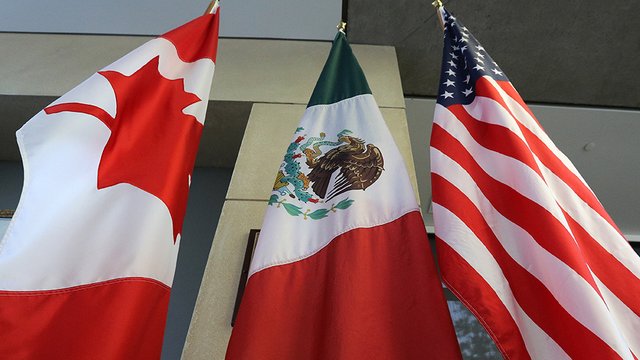The Hill: ‘New NAFTA’ is full of old policies that wreaked havoc on American farmers
by David Muraskin | October 9, 2018
“This new deal is an especially great victory for our farmers,” President Trump said of the proposed amendments to NAFTA. His administration is rebranding the deal as the United States-Mexico-Canada Agreement, or USMCA. But, no matter how hard he may try, the president can’t rebrand the actions and sentiments at the heart of his “deal,” which continues his legacy of caring more about the appearance of success than about actually aiding the voters who got him elected.
Announcing the deal at a Rose Garden ceremony, Trump was flanked by Treasury Secretary Steve Mnuchin (former hedge fund manager) and U.S. Trade Representative Robert Lighthizer (former corporate lawyer). That was entirely appropriate since “USMCA” is an agreement drafted with huge corporate agribusinesses — not farmers — in mind. And this latest handout to corporations not only undermines independent agriculture, but puts your family in harm’s way too.
Absent from the deal is any effort to restore transparent labeling on meat products. That’s despite the fact that my organization, Public Justice, ranchers across America, and even Fox News all begged the administration to use the NAFTA negotiations to fulfill its earlier promise to restore country-of-origin labeling. These labels — which existed for years — identify where meat was born, raised, and slaughtered. They provide consumers information they desire, and correspondingly increase the income of domestic producers who make the products U.S. consumers prefer.
Canada and Mexico challenged the labels before the WTO, and Congress removed the requirements to avoid retaliatory tariffs (a cruel irony given our current trade policies). Thus, a NAFTA renegotiation was the perfect opportunity to restore this policy that Congress, consumers, and farmers all support. Yet, embodying the style over substance standard that defines this administration, the revisions to NAFTA only change the headings of the sections, reproducing the exact same rules.
Where the Trump administration could have increased ranchers’ competitive position and aided consumers, it instead only secured the tools that would allow it to disingenuously claim action where, in fact, there was none.
The sole true “concession” Trump secured for ranchers is one the North American Meat Institute praises because it enables nearly complete integration. Translation: It allows a select few corporations that already control our meat supply to further solidify their lock on the industry at the expense of farmers. Worse still, it actively endangers the American public.
Under the revised NAFTA, the United States will have to coordinate its food safety and animal health rules with Canada and Mexico, facilitating the same race to the bottom that has defined our other trade agreements. Indeed, the revisions specifically call for speedier “equivalency determinations.” In effect, that means the stringent regulations on which American ranchers rely to promote their goods and consumers count on to protect themselves and their loved ones will be degraded. The only beneficiaries will be multinational corporations that can pass off products made abroad as equivalent to domestic goods.
You are also certain to hear a lot of people claiming the reworked NAFTA will benefit the U.S. dairy industry, which too is suspect. While there is no question dairy farmers are suffering and that the agreement expands dairy exports, one of the ways it does so is by increasing the market for highly processed products, such as milk protein concentrates. The profits from those goods will be skimmed off by conglomerates, never trickling down to farmers.
In fact, by focusing on manufactured goods, the Trump administration is looking out for companies at the expense of farmers, providing corporations greater leverage over actual dairy farmers.
So while exit polls in 2016 showed many rural voters turned to Trump because of his promises to rework trade deals to benefit American farmers, his revisions to NAFTA show that, once again, his primary concern is not for the American worker but corporate executives.
Farmers, consumers, and their representatives need to hold him to account. The “new NAFTA” is full of many of the same old policies that have wreaked havoc on American farmers, and it is anything but the “great victory” Trump is promising rural voters it will be.
David Muraskin is the food project attorney at Public Justice, a national public interest law firm that pursues high-impact lawsuits to combat social and economic injustice, protect the Earth’s sustainability and challenge predatory corporate conduct and government abuses.
